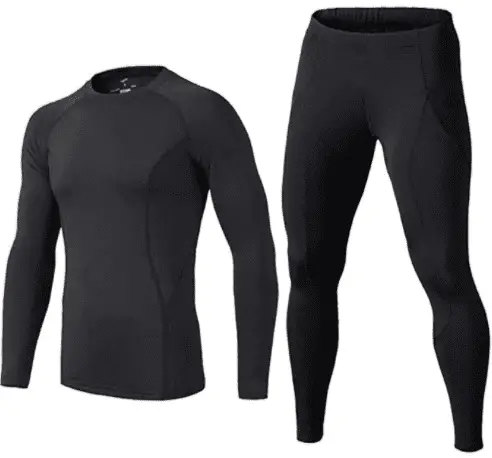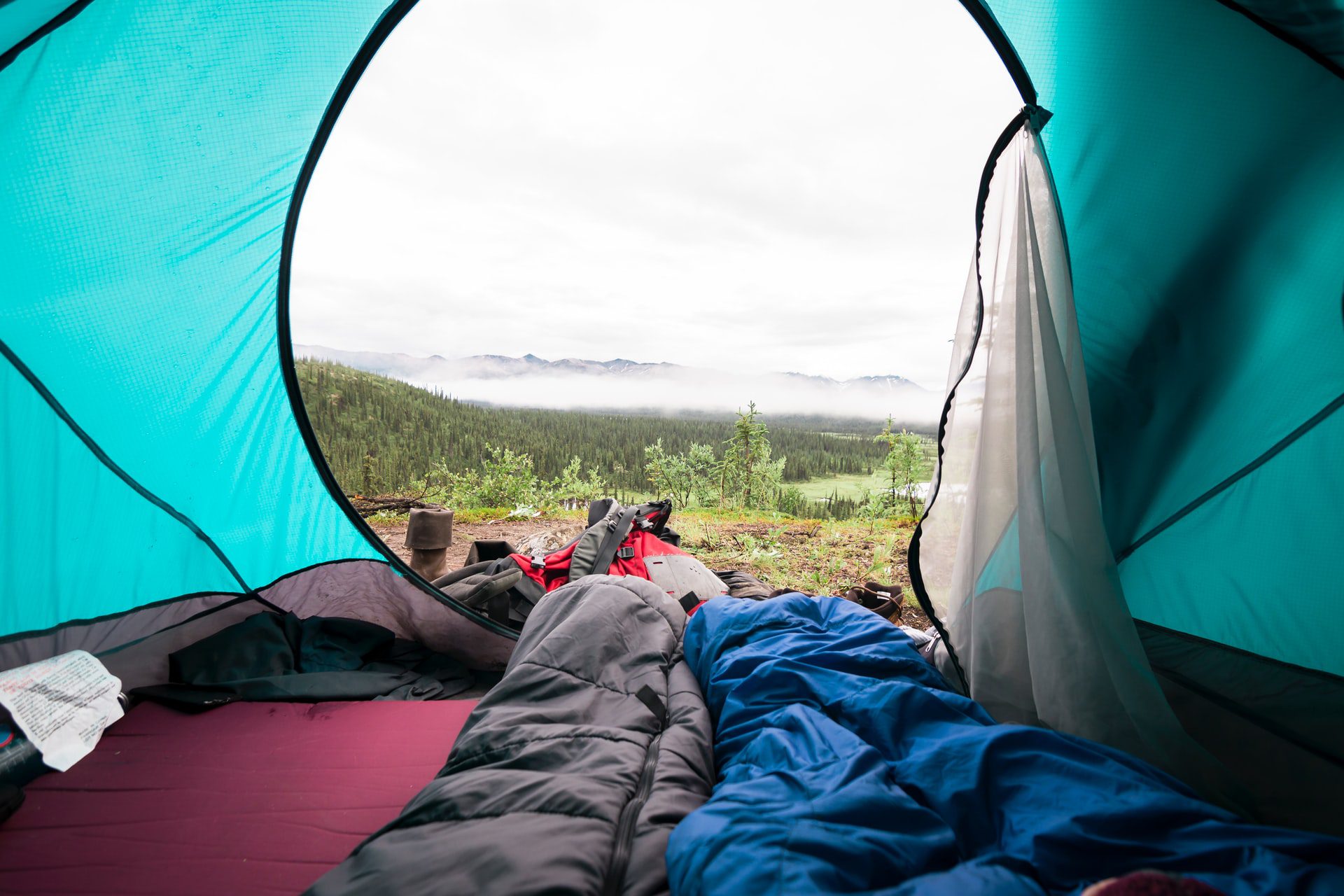Sleeping bags are a camping essential right? But can you camp without a sleeping bag? Whilst I would generally say no, there are some people I know who don’t use them at all. So based on their experience, I decided to find out how they camp without a sleeping bag.
How to camp without a sleeping bag really depends on the type of camping you are doing. If you are arriving at your camp by car, you can use a duvet from your bed at home. If you are walking to your final destination, something light like a sleeping bag liner, blanket or space blanket would be a good option.
Read on to find out more about my recommendations for camping without a sleeping bag.
Is a sleeping bag a camping essential?

For most forms of camping I would say that a sleeping bag is essential.
Getting a good nights sleep is one of the most important ways of remaining happy and healthy when camping. I’ve had many a holiday ruined by people being tired and grouchy after not sleeping well the night before.
A sleeping bag offers great bang for your buck in terms of warmth, weight and packing size. For people who are trekking to their final camping spot, the ease of packing and carrying a sleeping bag far outweigh some of the benefits of alternative options.
Does that make a sleeping bag essential though? Not really. It just depends on whether you value the convenience of one over the alternatives.
Sleeping bag alternatives
So you’re still not convinced that a sleeping bag is an essential piece of camping equipment and you want to review your options first. That’s fine. It’s your bed you’re making and you’ll have to lie in it.
Sleeping bag liner

The first alternative to a sleeping bag is a sleeping bag liner.
The advantages of a sleeping bag liner might not seem obvious at first, but when you see the size it packs down to, you will see why this would be a good option.
The above liner when packed down measures just 20cm x 8cm, which is very small when compared to a sleeping bag. It also weighs just 160 grams.
A sleeping bag on the other hand, like this one, measures 40cm x 25cm and weighs 2,060 grams.
The compromise of course is that they are not as warm as a proper sleeping bag, so for summer camping, this might be an option. For the winter, probably not.
Quilt or Duvet

The next alternative is to use a quilt of duvet.
There is a clear advantage to be had with a duvet, mainly how much warmer it is than a sleeping bag. The material a duvet is made from is also more comfortable than a sleeping bag, which can be noisy when sleeping.
The problem with a duvet is the portability compared to a sleeping bag. They are not designed to be packaged and carried inside a small bag, unlike a sleeping bag.
Weight wise a duvet will be a similar weight to a sleeping bag.
If you are trying to save on size when backpacking, this is not an option. However, if you are just stuffing your camping things in the boot of your car, a duvet could be an option.
Blanket

The next alternative to a sleeping bag is a blanket
One of the best things about using a blanket is that they are very warm, so you don’t have to compromise when choosing not to use a sleeping bag. They can also roll up quite tight, so can pack down fairly small.
Another benefit of a blanket is that it can be used on the ground for sitting, which you wouldn’t necessarily do with a sleeping bag or duvet. This can leave your blanket quite dusty or dirty, so as long as you don’t mind that then no problem.
For me, I personally find wool a little uncomfortable for sleeping, especially when pressed directly against my skin. This can be mitigated by wearing long sleeve clothes for bed.
A blanket is also quite heavy compared to a sleeping bag, so may not be the best option.
Wear extra warm clothes and thermal underwear

Another option if you don’t want to take a sleeping bag with you is to wear extra warm clothes.
The theory here is that the warmer your clothes are, the less likely you are to need to use a sleeping bag.
One option here is to pack extra clothes to wear during the night, which are thick and extra warm. The downside of this option is that having specific clothes just for the nighttime will add weight to what you need to carry and will probably take up more space than a sleeping bag would do.
An alternative option is to be clever with your clothing rotation and use the extra clothes you have packed as more layers for wearing at night time. For instance, if you have packed for a few days camping, you might want to wear a couple of different outfits. All you would do each evening is put all of your clothes on to keep you warm during the night and then remove the extra clothes in the morning.
Whilst this might sound like a good option, in reality, it doesn’t allow for the fact that some clothes might get wet or dirty. If they do, you’re a bit stuck when it comes to putting them on in the evening!
Make sure you protect the extremities with this method as well. Your feet and hands could get super cold, which will seriously impact your night’s sleep.
Leaves

Ok, this one sounds a little out there, but you could use leaves to keep you warm when camping without a sleeping bag.
I’m not suggesting you go full caveman here, but if you bring a duvet cover with you (which will pack small and be light), you could fill this with leaves! These leaves will work great as insulation inside the duvet cover and keep you warm. Sounds great ey!?
There are some obvious downsides here of course. One being that you have to find enough leaves to fill a duvet cover, which, depending on the time of year could be difficult. You would also have to find enough DRY leaves as wet ones would not work.
I wouldn’t put this option at the top of my list, but it could be a good alternative if all else fails.
Space Blanket

Another alternative is to use a space blanket to sleep with instead of a sleeping bag.
Space blankets, also known as foil blankets, are normally used in emergencies to keep people warm. In the past, I have been given one after completing a running race to help me keep warm.
If you find yourself camping without a sleeping bag, a space blanket might just be the thing you need.
Of course one of the main downsides here is that space blankets can be a little noisy when moving around. Whilst they might stop you from freezing, you will no doubt be woken up by the noise.
There are also not that warm. Great for emergencies, but not a long term solution for camping in cool weather.
Wear an extra warm jacket

The final alternative to a sleeping bag on my list is to wear an extra warm jacket.
If you get a feather down jacket, this will work almost as well as a sleeping bag at keeping you warm and has the added benefit that you can also wear it during the daytime as well.
However, a jacket is really only designed for the top half of your body and therefore won’t cover your lover half when sleeping. This means you will likely get cold legs when sleeping (unless you buy a really long jacket of course).
A jacket is can be a good option when you don’t have a sleeping bag handy but isn’t really an ideal alternative.
Conclusion
So, can you camp without a sleeping bag? In my opinion, there is no real substitute for a sleeping bag and I would consider it essential for camping. The ease of packing a sleeping bag and the fact it is specifically designed for sleeping (hence the name) to make make it an essential part of the camping experience.
Of course if packing light doesn’t matter to you then take a duvet if you are dead set on not taking a sleeping bag.

